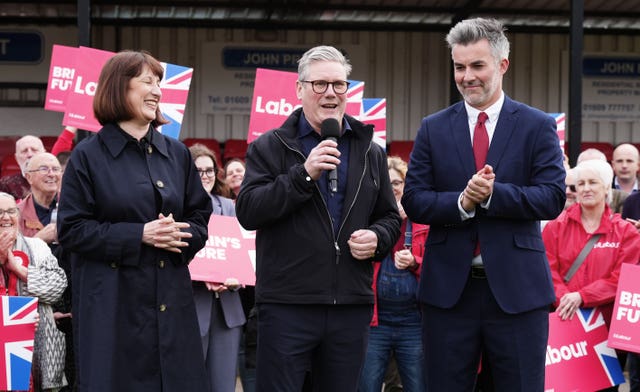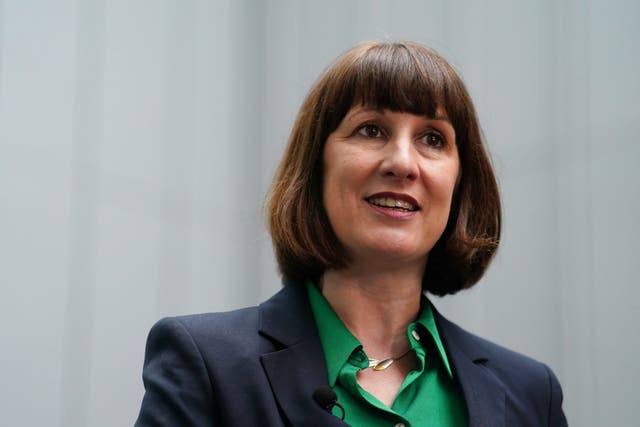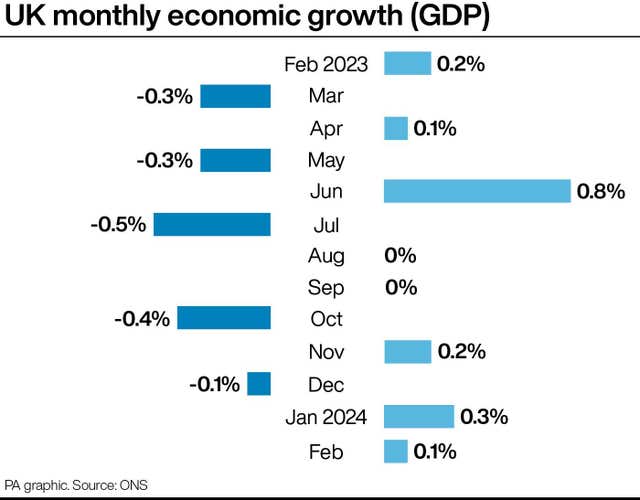Labour will fight next election on economy, says Reeves
The shadow chancellor accused the Government of ‘gaslighting’ the public by claiming Britain had ‘turned a corner’.

Labour will fight the next election on the economy, the shadow chancellor has said as she dismissed suggestions the UK was heading for a hung parliament.
In a speech in the City of London, Rachel Reeves said her party would use every day to “expose what the Conservatives have done to our country” and accused the Government of “gaslighting” the public by claiming Britain had “turned a corner”.
She said: “Instead of believing the Prime Minister’s claims that we’ve turned a corner, the questions people will ask ahead of the next election are simple.
“Do you and your family feel better off than you did after 14 years of Conservative government? Do our schools, our hospitals, our police, our transport work better than they did 14 years ago? Frankly, does anything in our country work better than it did when the Conservatives came into office 14 years ago?”
Asked about claims the local election results pointed to a hung parliament, Ms Reeves said Labour was “fighting for every single vote”, but had won in places it needed to if it is to form the next government.
She said: “I don’t think the results last week point to a hung parliament.”

The local elections brought a string of victories for Labour, including in Rishi Sunak’s own region of York and North Yorkshire and the key mayoral contest in the West Midlands.
Her intervention came days ahead of the Bank of England’s next interest rates decision on Thursday and the release of figures covering the economy’s performance over the first three months of this year on Friday.
Economists are widely expecting the Bank’s Monetary Policy Committee to keep rates at the current level of 5.25%, despite political pressure from the Government to start lowering rates before the election.

Ministers may be more cheered by the Office for National Statistics’ quarterly GDP data, which is expected to show the UK has exited its recession.
But Ms Reeves said that, having described the downturn as a “technical recession”, the Chancellor would be “comfortable calling it a ‘technical’ recovery”.
Acknowledging that inflation could return to its 2% target, interest rates could be cut and Britain could be out of recession as early as this month, Ms Reeves said: “I already know what the Chancellor will say in response to one or all of these events happening. He has been saying it for months now: ‘The economy is turning a corner’, ‘our plan is working’, ‘stick with us’.
“I want to take those arguments head on because they do not speak to the economic reality.”
She added: “During the local elections I travelled across the country. I spoke to hundreds of people. I listened to their stories.
“And when they hear Government ministers telling them that they have never had it so good, that they should look out for the ‘feelgood factor’, all they hear is a Government that is deluded and completely out of touch with the realities on the ground.
“The Conservatives are gaslighting the British public.”
While the Conservative Party is historically more trusted on the economy and stewardship of public finances, polls suggest Labour’s approach of stressing the need for stability and sticking rigidly within balanced tax and spending rules is working.
The party has heightened its attacks on what it calls “chaos and decline” under the Tories by launching a video series on a website dubbed “Conflix”.
The party has also secured the assistance of former Conservative minister Nick Boles, who quit the Tories over Brexit in 2019 and has been informally advising the shadow cabinet on preparing for power.

Mr Boles introduced Ms Reeves’s speech on Thursday, saying she understood the importance of demonstrating fiscal discipline to earn the right to bring about “transformative change”.
Ms Reeves vowed that Labour would boost growth and “raise living standards, resource public services, and let Britain compete in the world once again”.
She pointed to plans to establish a national wealth fund to deliver private and public investment, reform planning laws to build 1.5 million homes, and create 650,000 jobs in the UK’s industrial heartlands.
Asked whether Labour’s plans could still be achieved now it had rowed back on plans to invest £28 billion a year in the green economy, Ms Reeves said she did not think her party’s objectives required the sum it had first set out and planning reform would be key to securing private investment.
She said: “We can do that through other means including the creation of GB Energy, the national wealth fund and, crucially, those planning reforms.”
Ms Reeves also reiterated her party’s commitment to put forward legislation on a “new deal for working people” within the first 100 days of a new administration, but said businesses had “nothing to fear”.
She said: “The truth is that many, many businesses already go well beyond what is set out in the new deal for working people – they don’t have zero-hour contracts, they are not using practices of fire and rehire, they give better rights around sick pay.
“So businesses have got nothing to fear from the new deal for working people, but (for) businesses who do use these methods there will be a level playing field to ensure that businesses can’t undercut each other by using zero-hour contracts or through fire and rehire.”
She said Labour would “consult on how to implement these things so there aren’t any unforeseen adverse consequences”.
Conservative minister Laura Trott, the Chief Secretary to the Treasury, said Ms Reeves offered “only the same buzzwords and unfunded spending commitments” and could not say how Labour would grow the economy.
She said: “This is the same old Labour Party that always leads to higher taxes, higher unemployment, the betrayal of pensioners and the hammering of businesses – with Labour’s 70 new regulations that would cost jobs and damage economic growth.”





